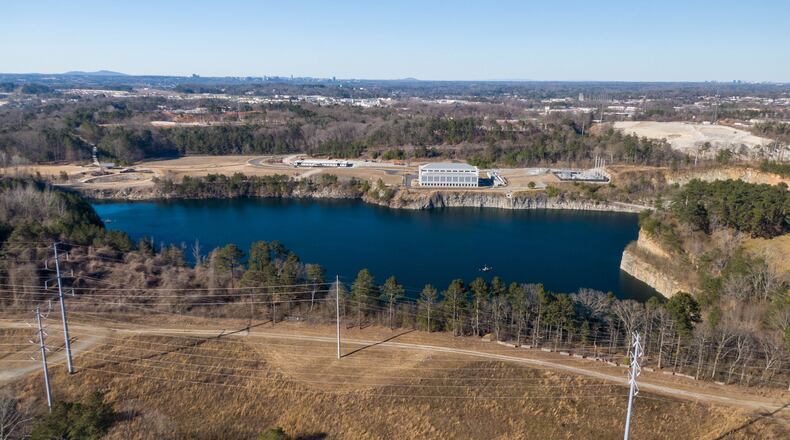A new law aims to ensure future housing developments around the nearly completed Westside Park in Atlanta include affordable homes for sale and rent.
But as the city prepares to open the park and Microsoft makes plans to build a massive campus on the Westside, neighborhood leaders are pushing for the city to do more to prevent low-income residents from being displaced.
The new measure, which passed the City Council on Monday, requires that future developments set aside a certain percentage of units as affordable — regulations that have the support of local residents.
But a group of community members on a task force focused on equitable development around Westside Park recently sent a letter to Atlanta Mayor Keisha Lance Bottoms saying the city is not doing enough to listen to residents and ensure the development around the park does not hurt the nearby neighborhoods.
“The neighborhoods surrounding the Westside Park will vocally withhold our support of the park’s opening until we have heard directly from Mayor Bottoms her plan to prevent the Westside Park from pushing out our neighbors and to meet our most dire needs,” the letter stated.
From local neighborhood advocates to top City Hall officials, many have grown worried that the future Westside Park, which will be the city’s largest park when it opens, will lead to an influx of investment, which will accelerate “gentrification.” When that happens, longtime, low-income residents in Grove Park, Center Hill and the other surrounding neighborhoods, which are historic and predominantly Black, might no longer be able to afford to stay.
The park is currently scheduled to open this year in late spring or early summer.
Last year, Bottoms put a moratorium on new construction permits in neighborhoods around the park in order to prevent real estate speculation that could lead to prices being driven up.
With that moratorium set to expire next week, city officials say a new ordinance will ensure future large housing developments offer affordable units. The City Council voted to establish an “affordable workforce housing overlay district” in the neighborhoods around the park. It includes Grove Park, Center Hill, Almond Park, Carey Park, West Highlands and Rockdale.
“Our Westside communities and legacy residents are the bedrock of our city, and our administration will take the necessary actions to ensure development is carried out in a thoughtful, inclusive manner,” Bottoms said in a statement following the passage of the legislation.
The regulations apply to any new development with more than 10 units; the city bases affordability on the area median income for metro Atlanta, which is $82,700 for a family of four. For rental units, developers must price at least 15% of units at rates that are affordable for someone who makes 80% of the area median income, or 10% for people making less than 60% of the area median income; 5% must be set aside for those making 30% of the area median income.
That is similar to rules around the Beltline that require new apartment complexes have some affordable units. The new Westside Park district goes further in providing the 30% area median income option and requiring that new for-sale housing developments, like condos or townhomes, also have affordable components. 10% of units must be evenly divided among buyers making either 80% or 120% of the area median income.
The median household income in several of the neighborhoods that surround the park is less than $25,000.
This is the first time the city has put affordability requirements on housing that is sold rather than just rented. The affordability requirements must be in place for 20 years.
Brandon Pierre-Thomas, the president of the Grove Park Neighborhood Association, said he supports the new overlay as a first step. But he said that “alone, it’s not enough to provide the substantive impact that we need.”
Pierre-Thomas was one of 10 community members who signed the eight-page letter to Bottoms and two of her top deputies last week asking for more engagement from the city related to the park and efforts to combat gentrification.
Members of the Westside Park Equitable Development Task Force, which was formed a year ago, said they feel the city has not taken enough steps to offset the displacement of residents and ensure the park benefits the nearby neighborhoods.
They also said they were not properly consulted before the city built a park entrance in Grove Park. They said those plans don’t offer the same access for the south side of the park as the two entrances on the northern border, closer to wealthier neighborhoods.
“We have united around a deep fear that our community is becoming just another repeated instance of the inequitable development and displacement of communities around Atlanta, such as the Old Fourth Ward, Kirkwood, Summerhill, and East Atlanta Village, and we are fighting that fate tooth and nail,” the letter stated. It added that “this is a battle your administration and our community (are) swiftly losing in the face of massive infrastructure investment and development from the city and Microsoft.”
They listed five steps they’d like to see the city take, including developing an anti-displacement strategy and traffic plan for the neighborhoods around the park. The letter requested a response from Bottoms by Thursday.
Pierre-Thomas said the community has tried to work with the city on several occasions over the last few years.
“We’re just not getting any traction,” he said. “We need to be respected and we need to be considered.”
The Atlanta Journal-Constitution reached out to the mayor’s office for comment earlier this week; it has not provided a statement in response to the letter.
About the Author







